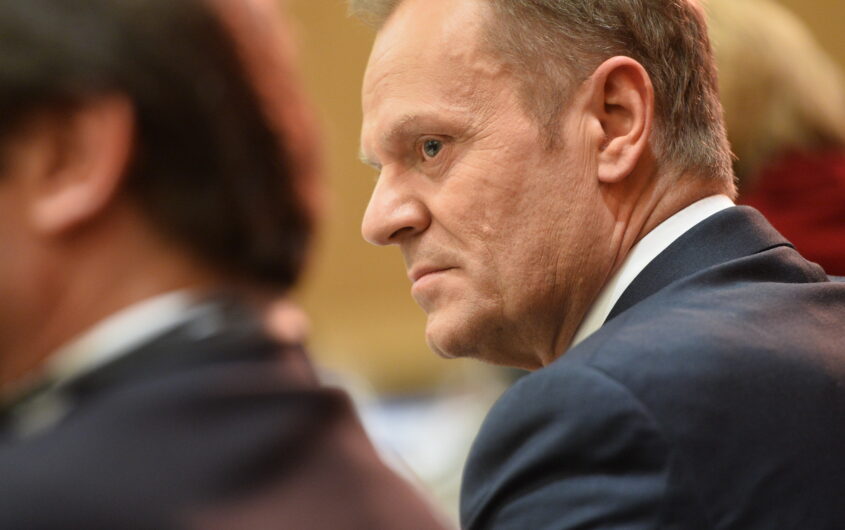
European People's Party via Flickr
The Opposition Wins in Poland

Martin Makaryan
Halle Foundation/AGI Intern
Martin Makaryan is a research intern at AGI in fall 2023. He assists resident fellows with their research projects, manages databases, and provides administrative and logistical support for AGI's events and programs. Mr. Makaryan is a master's student at the Johns Hopkins University School of Advanced International Studies (SAIS) where he specializes in security and strategy with a regional focus on Europe and Eurasia. At SAIS, he serves as the Eurasia Chair of the Europe & Eurasia Club and is a Staff Writer for the SAIS Observer. Prior to SAIS, he worked in government relations and non-profits and has written on foreign policy issues and European affairs for various publications. His areas of expertise include NATO and transatlantic relations, European security, Russia, and the post-Soviet space. He holds a Bachelor of Arts from the University of California, Los Angeles (UCLA).
Implications for German-Polish Relations and Western Unity
Poland’s ruling populist, conservative Law and Justice Party (PiS) lost the country’s consequential parliamentary election on October 15. While the party came in first in terms of its share of the popular vote and the seats in the parliament with 35.4 percent of total votes and 194 seats in the Sejm, Poland’s legislature, the centrist and left-leaning opposition parties have secured enough seats to form a coalition government. This puts former Prime Minister and European Council President Donald Tusk, whose centrist Civic Coalition party received 30.7 percent of the popular votes and secured 157 seats in the Sejm, in a favorable position to return to power if he is able to form a coalition government with the Third Way and Left parties.
The looming end of eight years of rule by PiS, during which Poland’s democratic backsliding and conservative-nationalist turn strained relations with the European Union and the staunchly anti-German official rhetoric alienated a key partner and neighbor, carries important implications for German-Polish relations. Eurocentric Donald Tusk’s possible return to power will also have an impact on Poland-EU relations and the transatlantic alliance.
A Deliberate Assault on Relations with Germany
Despite growing bilateral trade and people-to-people relationships with Germany, the Polish government has in recent years weaponized the countries’ complicated historical legacy and Polish nationalist sentiment in the form of severely anti-German rhetoric in the state-controlled media and public sphere. According to Dr. Maria Skóra, a research associate at Institut für Europäische Politik in Berlin, “Today, not a day passes without the [Polish] public media scolding Germany.”
The anti-German sentiment has not simply been an outburst of the ruling party’s nationalist ideas and its own interpretation of historical narratives; it has also served more practical political purposes. PiS has seized every opportunity to paint the opposition as part of Germany’s plot to “punish” or “subjugate” Poland. During the heated election campaign, Tusk was branded as a “German agent” working to push German interests at the expense of the Polish people. In a widely criticized and ridiculed campaign ad, PiS leader Jarosław Kaczyński appears to reject a call from Chancellor Olaf Scholz and then tells a German embassy employee, “Please apologize to the chancellor, but it will be the Poles who will decide the (retirement age) matter in the referendum. Tusk is no longer here, and these practices are over.”
The ruling party’s attacks on Germany have not only served to rally the Poles around the nationalist and anti-German line of the leadership. The Polish government has also tried to utilize the anti-German—and by extension the anti-EU—rhetoric to build a European coalition of right-wing political forces that can challenge what PiS views as a largely German-led Union. At the Warsaw Summit in 2021, the Polish government gathered the continent’s most Eurosceptic leaders, including Marine Le Pen from France and Hungarian President Victor Orban. The summit concluded with a joint statement that committed to “put a stop to the disturbing idea of creating a Europe governed by a self-appointed elite” and to the “social engineering aiming at creating a new ‘European nation.’” The summit was a significant moment in attempts to craft a Polish grand strategy based on common ideas shared with other Eurosceptic, nationalist, and conservative forces in Europe.
As with other nationalist political forces, the focus of PiS on scapegoating external forces has been an avenue to maintain its own standing and support among the people as the “guardian” of the country’s sovereignty, constantly under attack from abroad per the framing of the ruling party’s elites and state-run or state-affiliated media. And the perfect scapegoat has been Poland’s neighbor to the west and a leading economic and political powerhouse within the European Union—Germany.
As could be expected, Poland’s domestic democratic backsliding, issues with the European Union, and PiS’ unconstructive posture with Brussels, coupled with gradually intensifying anti-German rhetoric, have jeopardized German-Polish relations and made the concrete work between the German and Polish governments on key policy areas more complicated. The German government’s more restrained posture in the face of attacks and the official state propaganda from Warsaw has for the most part prevented a major escalation or a “war of words” between the key EU member states and NATO allies, but the impasse in the relationship has become more pronounced over time.
A New Beginning? Perhaps.
It is natural that against this backdrop, the election loss of PiS generated a wave of enthusiasm across the West that the illiberal tide in Poland, along with its implications for the country’s working relationship with Germany and the EU, will finally be reversed. Politico’s “Welcome back, Donald,” celebrating the presumed return of Tusk following the final election count, captures the mood in Brussels and Berlin.
With PiS ousted from power and a coalition government led by Tusk taking charge of a deeply polarized Poland, German-Polish relations will become more constructive, and some sense of partnership will return to the strained relationship. A reversal of the illiberal policies implemented by the PiS government—specifically the infringement on the independence of the judiciary which has been among the principal points of confrontation between the EU and Poland—by Tusk would be a welcome development for Poland and would positively impact its relationship with Germany and the EU. If Tusk became prime minister, he would be well-positioned to mend ties given his background and connections as the former president of the European Council from 2014 to 2019.
A change of power in Poland could uphold European unity at a time when political turmoil and a growing illiberal tide threaten the Union from within and Russia’s invasion of Ukraine continues to test Europe’s resilience and cohesion from outside.
At the same time, optimism that Poland will return to its pre-PiS course, including expectations that Tusk-led Poland will follow the EU’s line on different policies without questioning or pursue a closer relationship with Germany, is premature and ignores the reality of political circumstances that the presumed new government would face.
First, the very assumption that charismatic and Eurocentric Donald Tusk will be able to form a coalition government with the Third Way and the Left is still speculation. Poland’s President Andrzej Duda, a close ally of PiS, could jeopardize and delay the opposition’s attempt at forming a new parliamentary majority and a coalition government by allowing PiS the time to try and form a coalition government of its own, presumably with the far right. On October 24, the leaders of the opposition parties on the left committed to forming a coalition government with Tusk’s party and urged President Duda to not paralyze the process of forming a new majority in the Sejm. Yet, as is often the case in parliamentary democracies where elections do not yield a decisive victory by one party, politics at this stage can be quite unpredictable. The question of whether the Tusk-led coalition would function cohesively is yet another question to be answered if and when the coalition government takes charge.
Second, the presumed new government led by Tusk would still face domestic constraints on its ability to steer away from PiS’ policies and rhetoric. President Duda could use his authority to constrain the new government’s room to maneuver until 2025. Another issue is the transformation of the state apparatus and civil service over the course of the eight years of rule by the nationalist conservative government. Tusk’s new government will need to govern with a bureaucracy and state cadres affiliated with or under the influence of the former ruling party. Domestic public opinion on various issues and the still-significant popular support of PiS will form yet another “check” on the new government’s ability to pursue a liberal, pro-EU agenda.
Lastly, Tusk may be inclined to position himself in a more balanced position, especially when it comes to Germany. Not long ago, Poland’s most powerful politician from PiS, Kaczyński, accused Germany of trying to create a “Fourth Reich” in the form of the EU and impose its will on Poland, while Tusk has constantly been attacked as too pro-German. Given that such rhetoric still resonates with a significant segment of Polish society, Tusk will need to balance his stance on Germany in order to be able to govern effectively.
Tusk’s party is likely to deviate from the EU line on key policy issues, too, such as migration. During the campaign, the Civic Coalition spokesperson said they would not accept any policies that could “lead to the rising number of migrants in Poland,” referring to the EU migrant deal that the Polish government has vetoed and fervently opposes.
And yet, Tusk’s return to power would likely have a positive impact on German-Polish relations and mend ties with Brussels. At the very least, a respectful, working relationship will lead to a constructive dialogue on issues where Polish views may differ. Additionally, the unfriendly and unconstructive rhetoric from Warsaw on Germany is likely to diminish when a Tusk-led government takes charge, in turn allowing Berlin to take concrete steps towards full normalization.
More importantly, a change of power in Poland could uphold European unity at a time when political turmoil and a growing illiberal tide threaten the Union from within and Russia’s invasion of Ukraine continues to test Europe’s resilience and cohesion from outside. Although Poland’s fervent military and political support of Ukraine changed the Biden administration’s views on the Polish government—Biden had previously compared Poland to Belarus for its illiberal turn—the return of a centrist and generally pro-EU government in Warsaw will most certainly have a positive impact on the Polish-American relationship. Marginalizing Hungary’s illiberal and authoritarian Orban as the only major European “outlier” could provide a much-needed boost to a united Europe and contribute to the cohesion within NATO as well, despite policy disagreements that may persist between a Tusk-led Poland and the EU.








